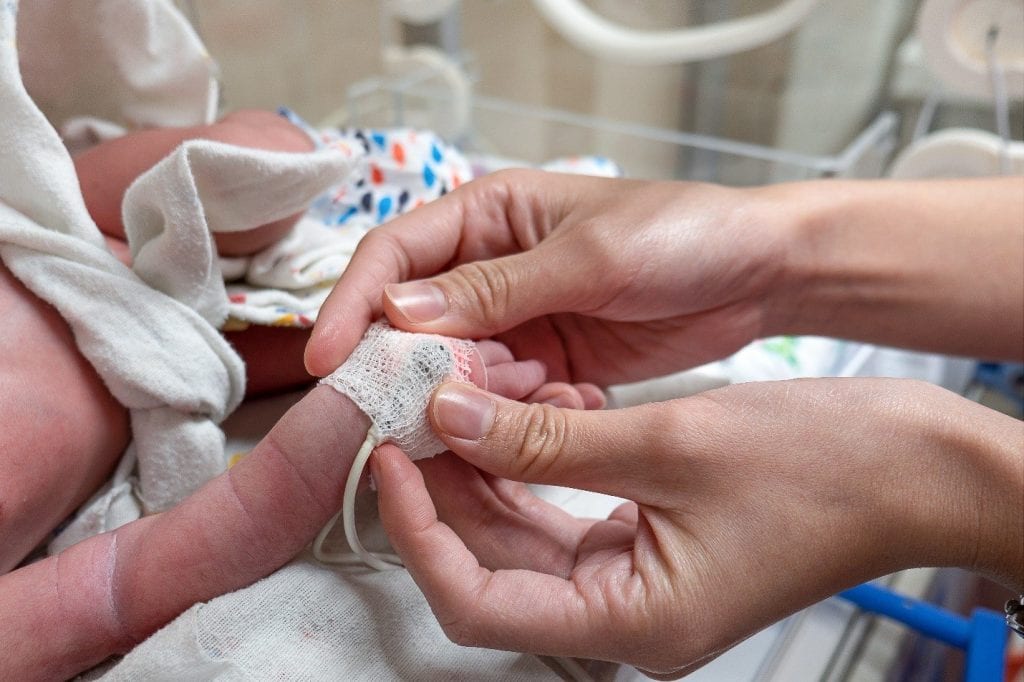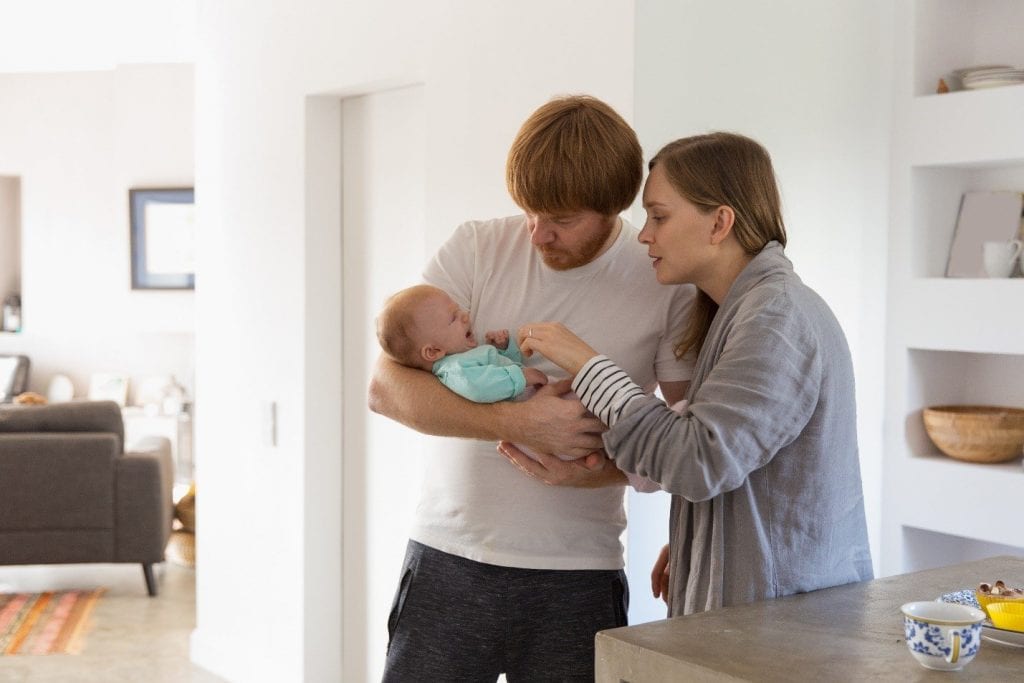
A family’s constant rock and pillar of support, dads of preemies play an important role in supporting their wife and family. This article explains what to expect and how to deal with the oftentimes stressful challenges of caring for a preemie.
Are you a preemie dad?
If you are, here’s a quick note from us to you:
You must feel like you’ve just stumbled upon unfamiliar terrain. You prepared for the day of your baby’s birth but nothing seems to have prepared you for the early arrival of your baby. It’s all overwhelming, confusing and it makes you very afraid – for your wife, for your children at home, for your tiny preemie fighting to survive. Sometimes it’s all too much to handle. Sometimes you feel like you have no control. You might already feel stretched out with all your responsibilities and obligations that you may sometimes be tempted to just shut down, go back to work or go anywhere else to just to be able to escape all these feelings.
Take a breath, dad.
We’re here to tell you that everything you’re feeling is all normal. Running away from any situation that overwhelms us is usually our natural instinct but, as difficult as it sometimes is, processing and acknowledging your feelings is the first step to coping with the many challenges of having a premature baby. Coping day by day might be a “new” kind of normal and you might feel isolated from the rest of the other dads, we can assure you that you are definitely not alone.
According to stanfordchildrens.org, “In the U.S., nearly half a million babies are born preterm. Many of these babies also have low birth weights.” This means that there are thousands of dads out there who are going through the same situation as you and going through the same thoughts as you.
This article is crafted especially for you. We will talk about common experiences as a preemie dad, what to expect and some tips to help you cope. While we may not perfectly capture everything exactly as how you see or feel it, we’ll do our best to create a handbook for you to help you carry through these challenging times.
A Preemie Dad’s Journey
The NICU (Neonatal Intensive Care Unit)

Key Points:
- Dad is needed as much as Mom to help the preemie baby’s overall development.
- The NICU is equipped with highly-trained doctors and specialized equipment that are more than capable of caring for pre-term babies.
- NICU basics such following doctor’s instructions, proper hygiee and sanitation and understanding the day-to-day routines of the NICU will go a long way in helping preemies grow and develop.
Super Preemie Dad, Because Not All Heroes Wear Capes
When a child is born, no one is prouder, no one’s smile is bigger and no one else’s heart is fuller than that of a new dad. They say that even if dads can’t carry their babies in their bodies, from Day 1 – daddies will always carry their babies in their hearts.
Other than overwhelming joy and happiness, the birth of a child may also cause worry, anxiety and concern. This is especially true for parents who welcome fragile pre-term babies into the world. Born well before their due dates and usually unexpectedly, a preemie’s birth can mean so much more than just worrying about sleepless nights and changing diapers at the wee hours of the morning:
- A premature birth means mom and dad will need to go home but will have to leave their tiny newborn in the hospital’s Neonatal Intensive Care Unit or NICU fighting for their young lives, each day a battle of survival – and survival is not just for the newborn but mom and dad have to learn to survive, too.
- A premature birth means the child has underdeveloped brain, heart, lungs, internal organs and immune systems which can lead to several health issues while in the NICU or even later in life.
- A premature birth means the child has underdeveloped senses including eyesight that needs to be constantly monitored for Retinopathy of Prematurity or ROP.
- A premature birth means that while most costs are covered by insurance, it can prove to be expensive.
- A premature birth can lead to earlier onset of post-partum depression for mom and mild to moderate mental health issues with dad, as well.
With all of the above factors, the NICU can offer expert help and support.
What To Expect & Important Things To Know About Your Preemie’s Stay In The NICU
Per the CDC’s recent statistics, “1 in 10 babies (10%) was born too early in the United States.” Babies are considered “born too early” if they are born under 37 weeks’ gestation which means they come out of their mother’s womb underweight and needing, careful, round-the-clock special care.
While in the womb, the baby depends on their mother for all their bodily needs and functions such as breathing, blood circulation, proper functioning of the kidneys, liver and immune system, among others. Nearly all pre-term babies will spend the first 30 days (or more) of their young lives in the NICU hooked up to wires, tubes, and monitors that will aid in the development that was otherwise provided by the mother’s body.
Essentially, the NICU is equipped to help preemies live and thrive even outside of the mother’s womb. The end goal of the NICU and its staff is to ensure that the preemie’s development will mean a better quality of life as the child grows.
At first, the NICU may appear to be a strange place filled with hushed voices of efficient nurses, doctors and residents making their rounds and parents/family members coming in and out to spend time with their newborns. It will seem intimidating, sometimes cold and isolating and the last place you thought you’d spend the first few days of being a father. But we assure you – there is no safer, calmer and better place for your tiny one.
As a preemie dad, here’s a few common things you can expect and need to know while your baby is in the NICU:
First things first – you are needed in the NICU, Dad.
It’s easy to assume that mom’s presence is most important in the NICU. But your presence and involvement are equally as important: Why?
- You’re usually the first one to see your preemie in an isolette in the NICU while your wife is recovering.
- You will be the first to hear from your neonatal doctor and attending nurses about your baby’s current status, vitals and the specific type of care and treatment your baby will need.
- Doctors and nurses will also be the first ones to tell you how important you are as no amount of medical care will ever equal that of a parent’s love and attention.
During the first 2 or 3 days in the hospital, your wife will need time to heal and recover. What can you do while your wife is recovering?
Maintaining consistent contact with the NICU staff and visiting your baby as much as you can will make a huge difference in the baby’s growth and development. You’ll probably need to acquaint yourself with your baby’s daily routine in the NICU for the first day or so but once you’re up to speed, it shouldn’t be too difficult to figure out when is the best time to visit throughout the day. It may be difficult to balance your time between mother and child, but it’s something that you’ll quickly learn to do.
Once you’re at the NICU and you’ve been properly oriented about your baby’s condition, you might find yourself looking at your tiny baby and asking yourself, “Now what?”. That’s normal, too, Dad. While we know how much you deeply love and care for your baby, most fathers may not have the “maternal instinct” that mothers naturally have. There is nothing wrong with that, either. You simply need a bit more time to adjust to your role as a dad. It will come.
Here are some ideas for you.
During your baby’s time in the NICU’s isolette, you usually won’t be able to touch or hold your baby during their first 2 weeks or so. Their tiny faces will be partially covered with feeding tubes and endotracheal tubes to help your baby feed and breathe.
But even ensconced in the warmth and safety of the isolette, each time you visit, your baby feels your presence and hears your familiar voice just like he did in his mother’s womb. Even if you can’t hold your preemie yet, you can still find ways to bond with your baby as this lays the important foundations of your baby’s growth and development. And we’re telling you, your baby will communicate right back through their own body language!
Here are some bonding ideas that you can do with your baby:
- Talk, sing or read to your baby. Your voice is not only soothing, research shows that it actually helps your baby’s brain develop.
- Pay close attention to your baby’s body language. Small as they are, they can express themselves through their movements.
- Talk to your baby’s bedside nurse. Ask them about your baby’s progress and ask as many questions as possible but remember that they are also busy caring for your baby and other babies in the NICU, as well. Balance your questions between their tasks or, better yet, list your questions down to ask at an opportune time while in the NICU.
- Take photos to show to mom and other members of the family who are excited to see and track the progress of the tiniest, newest member of the family.
When your baby is ready to be touched and held, the NICU’s doctors and nurses will inform you straightaway. This is a breakthrough in your preemie’s life and worth celebrating! And there’s so much in store for you and your baby.
Mom will usually have recovered fully at this stage and should now be up and about to visit your baby with you in the NICU. Together, you can work together for bonding activities with your growing preemie. With doctors and NICU staff, you are the perfect team to take on a family-centered approach in the development of your preemie.
Here are some more NICU bonding ideas that you can definitely play a role in while Mom is pumping breastmilk, resting or caring for other children:
- Participate in skin-to-skin contact or Kangaroo Mama Care. Your baby getting to know your scent, not just mom’s, will truly help soothe and help the baby develop.
- Be hands on – learn how to bathe, change nappies, feed or simply hold your baby. Your preemie’s bedside nurse will appreciate the extra helping hand.
- Whenever you can, touch and massage your baby. Touch therapy simply helps your baby thrive and helps you relax, as well. Studies show that babies who are held more often are less fussy and have fewer health issues.
- Play with your preemie. Small as they are, play is essential to them and hearing you laugh and seeing you make funny faces makes a huge difference.
The NICU’s capable staff will take care of your preemie.
It’s easy to feel anxious and scared on a day to day basis when you have a small preemie in the NICU. As much as you want to be by your baby’s side for long periods of time, you have other matters to attend to and a family to take care of.
But you should trust that the NICU provides skilled neonatal doctors, specialized equipment and compassionate, experienced nurses that will provide lots of special care for your tiny preemie. The NICU’s goal is to track your baby’s development, make sure your baby is fed properly, cared for, gaining weight and free from infections.
The best way to keep your mind at ease is to always maintain clear communication with your neonatal doctor and NICU nurses at all times. This means that you should always ask questions and talk to the staff regularly. No question is too small or too unimportant to ask. The NICU staff are capable, trained and experienced and completely understand your position as a dad and won’t mind you asking away.
To make the most out of the expertise of your baby’s attending doctors and NICU staff, here are a few tips:
- Keep the NICU’s phone number and your neonatal doctor’s contact details on speed dial as you may need to contact them anytime during the day.
- Print yours, your wife’s and emergency contacts on paper and leave them by your baby’s bedside or at the nurses’ station in case they need to contact you.
- Establish regular hours to call the NICU from work or home so they’ll know to expect you at specific times of the day.
- Doctors and nurses will give you updates every day. Keep your own diary of important notes and highlights of your preemie’s stay in the NICU. You and your wife can take turns filling it out should one be out and only the other can visit.
- The NICU may sometimes need for you to come by on short notice but sometimes you may not be available straightaway, connect with family members or close friends who are ready to step in should they be needed.
For yours and your preemie’s safety, here some NICU basics for you to follow at all times.
We’ve established that the NICU can first seem like an overwhelming place. Here’s why:
- You will be advised to wash your hands rigorously with antibacterial, liquid hand soap and warm water before stepping inside the inner part of the NICU.
- You may be asked to wear a surgical face mask, gloves and shoe covers before coming in to visit your baby.
- Taps of hand sanitizers and antibacterial hand gel abound as nurses will further ask you to keep sterilizing your hands every once in a while.
- The sounds and beeps of ventilators and other machinery amid the hushed, quiet tones of doctors and nurses may appear intimidating, cold and impersonal.
- Other large machinery like ultrasounds or X-rays may be wheeled in from time to time.
- The NICU’s lights are usually dimmed and it’s generally quiet adding to the seemingly intimidating nature of the NICU.
Once you understand the reasons for the above, though, you’ll soon realize that the NICU is not intimidating at all but instead it is a safe, calm space staffed with experienced medical and healthcare providers whose only goal is to make you baby grow strong and develop well enough to be discharged out of the NICU’s care as soon as possible.
We’ve made a quick table of the above NICU basics with reasons why it’s important to follow them at all times:
| You will be advised to wash your hands rigorously with antibacterial, liquid hand soap and warm water before stepping inside the inner part of the NICU, possibly wear surgical face masks, gloves and shoes covers and asked to sanitize your hands with antibacterial hand gel regularly while visiting your baby.
|
The NICU is filled with premature babies and sometimes, sick babies with severe conditions with underdeveloped immune systems that make them prone to infections. Even as simple as a common cold can be devastating to babies in the NICU. Washing hands before coming in means reducing or eliminating the risk of spreading infections. |
| The sounds and beeps of ventilators and other machinery amid the hushed, quiet tones of doctors and nurses may appear intimidating, cold and impersonal.
|
Ventilators, heart monitors and other special machinery provide babies with the care and monitoring needed with as little physical handling as possible. Doctors and nurses also consistently need to keep each other abreast of the situations of the babies under their care. They need to pay close attention to charts, monitors and reports at all times. They do not mean to be cold or impersonal but they are just simply doing the important work of caring for preemies. |
| Other large machinery like ultrasounds or X-rays may be wheeled in from time to time.
|
Preemies and other babies that require special care need to undergo several lab tests. Some equipment may not be available in the NICU and will need to be separately wheeled in. Rest assured, the staff are well-trained and know exactly how to handle your tiny preemie while undergoing these tests. |
| The NICU’s lights are usually dimmed and it’s generally quiet adding to the seemingly intimidating nature of the NICU.
|
Generally sensitive to sensory stimulus around them, preemies and babies thrive in a dim, soothing environment similar to that of their mother’s womb. |
Understanding the NICU at a deeper level helps you relax and trust that the staff will do all they can to help your preemie thrive and grow.
Supporting Your Wife And Your Family

Happy Wife, Happy Life.
One of the most important roles a dad will play in the life of their family is not just as the provider but also the main supporter of his wife and mother of his children. It’s usually a difficult role and many dads feel that they should overcompensate for their wife’s sacrifices especially that of the sacrifice and hardships of pregnancy and childbirth.
After birth, most of the attention is usually on mom. And rightfully so. It’s mom’s body that changes during pregnancy and she experiences further physical and emotional changes when the child is born. And for preemie moms, added on top of those changes are mixed feelings that include guilt, fear, worry and overthinking that settle in during the lead-up to a premature birth until well after the preemie is brought home.
What can you do, Dad, to help and support your wife? Here are a few suggestions:
Listen and talk to each other about your feelings.
Understand and acknowledge that she may feel guilty and blame herself for the early birth of your baby. She might continually question herself and repeatedly ask reasons why it’s happened. Talking about her feelings will also help you process yours. Your days can sometimes be filled with doctor’s rounds and updates from nurses that you’ll sometimes you’ll barely have time to spend time with each other. You can set aside a designated time in your day for the both of you to talk to each other about how you’re coping with the situation. You can also ask the NICU for any group support services available for preemie parents that you can either attend together or, if that’s difficult then you can have a good friend or family member accompany her.
Assist her with pumping breastmilk.
She will be asked to pump breastmilk for your preemie. Depending on how many weeks along she was when she gave birth, sometimes the milk hasn’t actually come in yet. She will have to work hard in ensuring that your baby will have enough breastmilk. In order for her to do that, she must consistently pump milk every 2 or 3 hours every day usually until after your baby is discharged from the NICU or even well after the baby has returned home. Pumping breastmilk isn’t easy and you can help her by sterilizing bottles and parts of the breast pump, labelling breastmilk bags with the correct time and date or simply supporting her throughout the process. Research shows that, if stressed, breastmilk will not flow as much as when Mom is relaxed.
In addition, preemie babies are usually not strong or developed enough to know how to suckle from their mother’s breast. Their “suck reflex” just hasn’t developed yet. Because of this, preemies are usually “taught” how to suckle while still in the NICU and “practice” on mom. Supporting your wife through this process is very important.
Later on, should your wife decide to formula-feed your baby, support her through that, too! Breastfed or bottle-fed, this is for parents to decide.
Take her out or let her sleep and help around the house, whenever you can.
This may hard to do especially if you have other children plus work and the demands of the NICU. Also, sometimes doing the normal things that you used to do before birth feels “wrong” while you have a preemie to care for but it is quite important that you break away from the routine of caring for children and simply find time for some rest and recreation.
Do your research and help her prepare for your preemie’s transition from NICU to home.
Even when a preemie is discharged from the hospital and declared healthy enough to be sent home, special care may still be needed. Some still require heart monitors or ventilators while some still have the feeding tube attached. Since preemies are also prone to infection, your home will need to be cleaned and disinfected before the arrival of your preemie. It doesn’t have to be hospital-grade sanitation, but just having your home generally clean and as dust-free as possible should be good enough.
If you have other children, have a talk with them and advise them to keep a good distance away from the baby for the time being or, at least wash their hands before spending time with their newest baby sibling. If they are sick or have colds or flu, it’s best to keep them isolated or perhaps spend some time with a grandparent or close family member.
Enlisting The Support Of Family, Close Friends And Your Bosses/Colleagues

To Raise A Healthy Preemie – It Takes A Village, It Takes A Tribe
It’s been mentioned several times in this article that family members and close friends can play a great supporting role once you have a preemie. They can become emergency NICU contacts, they can help drive your older children to school or simply help around the house. Even younger siblings can help in bonding activities at the NICU like this sweet older brother in Sweden who helped with skin-to-skin contact with his younger siblings.
Keeping an open line of communication with family members and close friends will allow them to help you care for your preemie while still in the NICU and after.
How can friends and family help?
- If you have other children that need to be brought to school, soccer practice or day care then this might prove to be difficult to organize if your wife suddenly gave birth before the expected date. As you will still need to be in the hospital for at least a week then, where possible, you can ask help to create a carpool network with friends and family while you and your wife are still in the hospital. Should this be possible for them to do, you can create a quick schedule for them to refer to.
- If grandparents or aunts and uncles are available, they can then definitely help with caring for older children or providing support and giving what you need during your stay in the NICU.
- Talk to your boss and colleagues about your situation. They are usually supportive and give you the time necessary to take care of your baby.
The bottom line: Don’t be afraid to ask for help. Your family and friends are the support system you need during your baby’s time in the NICU.
Take Care Of Yourself, Dad!

Because Dad Needs Self-Care, Too.
In a recent survey conducted by Northwestern University, results showed that dads were actually more stressed than moms during the tough transition from the hospital’s NICU to home. In the survey, participants’ stress levels were measured and results showed that dad’s stress steadily increased even when the baby has returned home and mom’s stress results showed no remarkable changes.
This survey’s results are interesting to note especially when we expect moms to be a lot more stressed out and emotional compared with dads especially following a premature birth. However, some may argue that this is really not a surprise.
As the natural rock and foundation of the family, you will usually want to appear steadfast and stoic for their families. And while this is may not be true for all dads, most usually like to keep their feelings to themselves and do whatever they can to support their families.
What can you do, Dad, to manage your stress levels?
- Don’t be afraid to admit that you are tired. Supporting your wife and family definitely doesn’t mean that you’ll run yourself ragged and stretched out to your limit. Just do your best to help where you can and rest when you need to.
- Find some time for yourself. May it be a quick coffee run or simply resting when the babysitter is around, time for yourself will help you rest and recharge for another day.
- Negative thoughts can sometimes cause stress. If you find yourself sometimes thinking about the worst-case scenarios more than usual, try to think about the good things, talk to your baby’s doctors and nurses or simply be by your baby’s side.
- You may sometimes find yourself spending long hours in the NICU. After you’ve spent time with your baby, talked to them or sang to them, you yourself can listen to music or even browse some movies on Netflix from your phone to relax.
- Spend some alone time with your wife – even in the NICU’s waiting area, even in the hospital, whenever you can – you are both each other’s best support system.
There are so many ways you can earn some serious dad points! You can get her a gift, take her to a spa, get a massage or you can do simple things like do the groceries or even shop for preemie clothes for your baby.
Conclusion:
Being a preemie dad isn’t easy! But with the right mindset and right support, you can overcome these challenging times and be the best preemie dad you can be.
We’d love to hear your thoughts. Share your amazing preemie stories with us below!
Leave a Reply